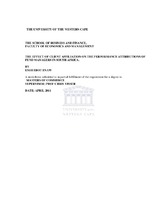| dc.description.abstract | This study seeks to evaluate the performance of unit trust managers based on their client affiliation classification. Worldwide, the number of investors investing in unit trusts is on the rise and increasingly they want to be able to evaluate the performance of the managers managing their funds so as to make better investment decisions. This increase in the asset size and number of unit trusts funds could be attributed but not limited to the low capital required for investment by small investors who before could not afford to invest in portfolios requiring large capital (Prather, Bertin, and Henker, 2004). In addition, the fund managers of these units are believed to have special skills such as market timing and stock selectivity which contribute to the performances they achieve. The evaluation of the performance of unit trust fund managers is a largely unexplored area in South Africa. As a result, the study focuses on South Africa fund managers and has as aim to evaluate the performance of two groups of fund managers (independent and dependent) who were classified based on their client affiliation structure. The client affiliation classification is as a result of the fund manager's clientele base. The dependent group are those who formed part of a group structure and offer other wealth management services for which their clients or investors in the unit trust services originate from within the group while the independent group are those whose clients are pulled together from diverse individuals or institutions and does not form part of a group or render other services other than fund management. Two fund types were selected namely; general equity funds and balanced funds. It has also examined the underlying skills the different groups of fund managers possess. The performance of unit trust has an effect on many parties who are related in one way or the other to the unit trust funds. The results of this study will inform individual investors, trustees and asset consultants in their decision making process of selecting a fund manager. The results of the study will be of value to the asset management industry in terms of assessing their structures and restructuring the investment service business to meet the expectations of their clients; the investors. It could also be used as a marketing tool. Publicly available historical data on the returns generated by fund managers for a five year period from 2005 to 2009 was obtained. Analyses were done using the independent sampled t-test and the Treynor Mazel model respectively for the different research questions posed. The results obtained indicated that there were no statistically significant differences between the performances of independent fund managers with those of dependent fund managers. However, dependent fund managers of equity funds performed better than their counterparts the independent fund managers. In the case of balanced funds, the independent fund managers performed better than their dependent counterparts. On average, both fund manager types possessed selectivity skills for equity funds and none for balanced funds. However for both fund types, the dependent fund manager demonstrated more selectivity skills than their independent counterparts. The results for market timing skills demonstrated that on average, both fund managers did not possess market timing skills for balanced funds while possessing these skills for equity funds. The dependent fund managers demonstrated more market timing skills for balanced funds though negative when compared to that of their counterparts. On the other hand, the equity fund independent fund managers demonstrated more market timing skills than the dependent fund managers. | en_US |

